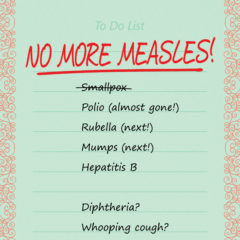Rubella causes birth defects!
In most people, rubella virus infection causes a mild flu-like illness with rash that looks a bit like a measles rash. Rubella is sometimes called “German measles” or “3‑day measles”. Unfortunately, if a woman catches rubella while she is pregnant, she may miscarry, or the child may be born with serious birth defects, such as blindness, deafness, or mental retardation. Here is a story of a young woman who has congenital rubella syndrome because her mother caught rubella while carrying her:
The rubella vaccine is a “live” vaccine. As such, it has never contained the mercury-containing preservative thiomersal. The measles vaccine is generally given in combination with the vaccine for mumps and the vaccine for rubella. There is no reason to give these vaccines separately. Giving the vaccines as separate injections simply means more injections for the child and more chance that one of the vaccines will be missed.
Because the measles virus is a “live” vaccine, it cannot be given to some people, including children with a suppressed immune system. Nor can it be given to women who are already pregnant. Those individuals depend on the herd immunity that results from practically everyone else being vaccinated.
Once rubella has been wiped out through vaccination, we will no longer need to vaccinate anyone against it. For more information, visit the Web site of the Measles and Rubella Initiative.


